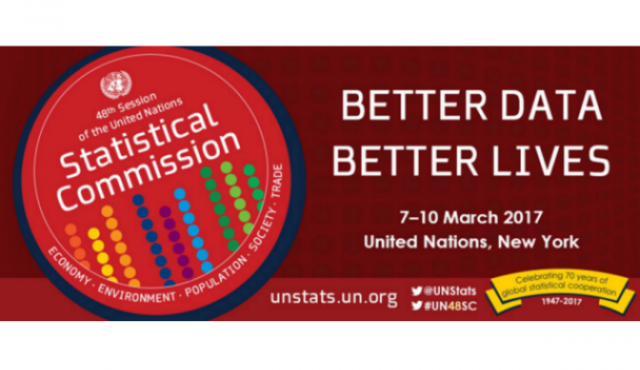By Silvia Montoya, Director of the UNESCO Institute for Statistics

Around the world, national statistical offices (NSOs) and line ministries involved in data collection and production are throwing their energies into efforts to track progress towards the Sustainable Development Goals (SDGs). National statistical systems in developing countries – often under-resourced, under-staffed and under pressure – already achieve miracles with the limited tools at their disposal. Now they are being pushed even harder, with the SDGs calling for more and better data for a wider range of development issues.
NSOs and line ministries are the un-sung heroes of the push for sustainable development and the critical importance of their work is captured perfectly in the title of next week’s session of the UN Statistical Commission: Better Data, Better Lives. In short, the data gathered by countries have a direct impact on the daily lives of citizens the world over.
That is why the UIS nurtures such a close working relationship with countries. Many of our blogs have highlighted our role as the official data source within the international education community for data on education, science, culture and communication. But we also play a key role in the global international statistical community around the SDGs, especially for the education goal: SDG 4.
Tracking progress towards SDG 4 requires data from different sources, but this cannot be at the expense of comparability. So we work with NSOs, line ministries, assessment centres, civil society groups and international partners to set the standards, develop the methodologies and harmonize data from different sources through a range of initiatives, such as the Global Alliance to Monitor Learning (GAML) and the Inter-Agency Group on Education Inequality Indicators (IAG-EII). This collaboration is critical because, with just 13 years to the SDG deadline, there is no time to waste on untangling conflicting data.
At the same time, we are working with partners across the UN Statistical Commission to address issues related to the global reporting of SDG indicators. In particular, we have been helping to develop a set of key principles to improve the data flows between national and international statistical agencies and the sharing of data among international organizations and with the public. We will help to present this proposal at the High Level Forum on Official Statistics, which is being organized by the Commission on 6 March.
To begin with, the proposal focuses on the production of international estimates for SDG indicators. The central aim is to ensure country ownership and avoid confusion among data users by using, to the extent possible, data produced by national statistical systems. But very often, the data are not available so we have proposed a set of practices and principles for estimating or adjusting national data. This covers everything from the selection of statistical methods and data sources to the consultation and review process by countries to validate the data prior to their release.
The proposal also aims to guide global data reporting and sharing of SDG indicators. We must reduce national and international reporting burdens by making the best use of existing reporting mechanisms and platforms while strengthening coordination among national and international statistical agencies. This area includes a range of practices – from the use of SDMX to dissemination procedures to ensure that only one value is reported in global databases for each indicator.
The proposed principles can effectively reduce the burden on countries while ensuring their ownership of the data. At the same time, the UIS is also demonstrating how attention to the design of data collection instruments can help to inform SDG4 targets.
On education finance, for example, our new paper to the UNSC examining data on household expenditure on education drew on metadata from household surveys compiled by the International Household Survey Network (IHSN). We screened the surveys against a set of minimum criteria and classified them according to their degree of usefulness for calculating SDG indicator 4.5.4 on education expenditure per student by level of education and source of funding. We found marked differences in the breadth of information collected on education expenditure and the methods used to collect it.
So by harmonizing the design of national household surveys, it is possible to enhance the availability and quality of global data on education finance. A first step for NSOs would be to ensure that consumption/expenditure surveys cover, at a minimum, the household expenditure on education described in the UNESCO-OECD-Eurostat (UOE) framework which defines, among others things, what can and cannot be included.
NSOs can also draw on the National Education Account (NEA) methodology developed by the UIS with partners, which envisages comprehensive data collection, processing and analysis that captures all sources of education funding: international, government and, very importantly, the private spending by households.
The UIS will be busy over the next week, highlighting such approaches at the meeting of Chief Statisticians of the United Nations System (CCS-UNS) on 5 March, and the Coordinating Committee on Statistical Activities (CCSA) on 6 March, both of which set guidelines and standards for organizations working in international statistics.
At the Statistical Commission session itself, the first day on 7 March will focus on the SDGs, with reports from the Inter-agency and Expert Group on SDG Indicators (IAEG-SDGs), in which the UIS participates actively. There will be discussions on refining some global indicators, but the SDG indicator framework for SDG 4 is now in place – the result of the proactive heavy lifting done by the UIS, other international and regional organizations and partners.
Above all, the Commission meeting will enable the UIS to deepen its strong connections with the Directors of NSOs as they pursue the better data that are needed to build better lives.
We’ll be hearing more from NSOs on this blog in the coming months as – with support from the UIS – they pursue data that support the achievement of the SDGs.
Leave a comment